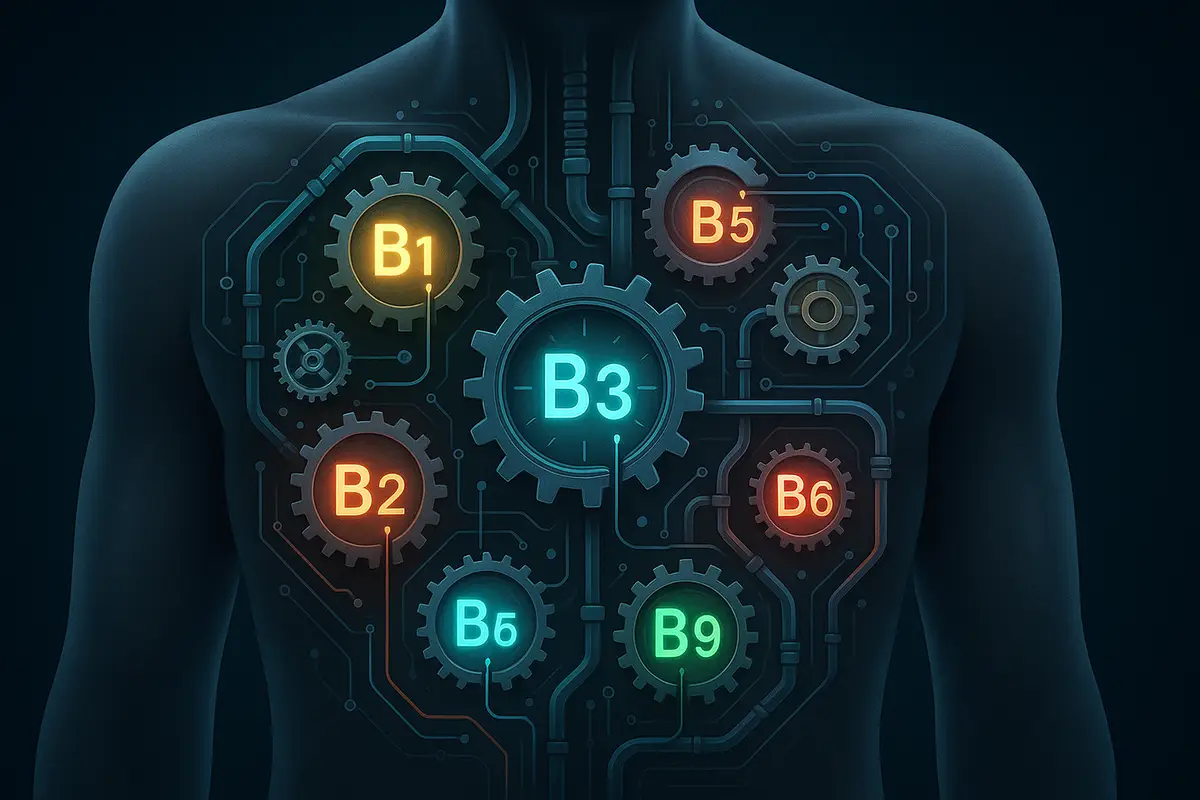Let’s face it—modern life is exhausting. Between juggling work, family, and the stress of daily life, our bodies are running on empty more often than not. That’s where B Complex supplements come in. Packed with all eight essential B vitamins—B1 (thiamine), B2 (riboflavin), B3 (niacin), B5 (pantothenic acid), B6 (pyridoxine), B7 (biotin), B9 (folic acid), and B12 (cobalamin)—this powerful combo is like a behind-the-scenes crew working to keep your brain sharp, your energy high, and your mood in check (Harvard T.H. Chan School of Public Health).
Prevalence of B Vitamin Deficiency in Adults Aged 60+
| Vitamin | Deficiency Prevalence (%) |
|---|---|
| B6 | 49% |
| B12 (6% clinical, 14% marginal) | 20% |
| B2 | 10% |
| B1 | 5% |
| B3 | 5% |
| B5 | 5% |
| B7 | 5% |
| B9 | 5% |
This chart highlights the prevalence of deficiencies in various B vitamins among adults aged 60 and above. Vitamin B6 shows the highest rate, while other B vitamins demonstrate relatively lower deficiency levels. Notably, B12 includes both clinical and marginal deficiency cases.
These vitamins don’t just play nice together—they’re built to work as a team, supporting everything from your metabolism to your nervous system. Whether you’re chasing deadlines or just trying to make it through the day without a nap, B Complex could be the boost your body’s been waiting for. And with options like capsules, sprays, and even drinkable formulas, there’s a delivery style to fit every lifestyle.
Who Needs B Complex Vitamins the Most?
B Complex vitamins are crucial for everyone, but especially beneficial for:
- Adults over 50 – As we age, our metabolism slows and nutrient absorption weakens. B vitamins help compensate for that drop, supporting energy and mental clarity. It’s like adding a turbo boost to an aging engine (Mayo Clinic).
- Pregnant and breastfeeding women – Folic acid (B9) and B12 are essential for healthy fetal development and reducing the risk of neural tube defects. Think of them as critical blueprints for building a healthy baby (CDC – Folic Acid).
- Individuals with chronic stress – Stress burns through B vitamins quickly. These nutrients are essential for calming the nervous system and restoring balance—like recharging a drained battery (Journal of Psychopharmacology, 2013).
- People on certain medications – Drugs like metformin or acid reducers can interfere with vitamin B12 absorption. Supplementation ensures your body still gets what it needs to function properly, despite pharmaceutical side effects (National Institutes of Health – B12 Fact Sheet).
Biological Function Strength – Energy Metabolism
Biological Function Strength – Brain & Nerve Health
Biological Function Strength – Immune Support
This multi-section chart illustrates the relative strength (scale 1–5) of B vitamins in supporting energy metabolism, brain & nerve function, and immune health. Visual scaling of the bars enhances comparison across vitamins and categories.
Key Benefits of B Complex Supplementation
1. Boosts Energy Levels
B vitamins help convert carbohydrates into glucose, which your body uses for energy. Deficiencies, especially in B12 or B6, often lead to fatigue (Cleveland Clinic).
Think of your body as a car engine—without proper fuel, it can’t start. B vitamins are like premium gasoline for your metabolic system. A persistent lack of them may result not only in sluggishness but in chronic fatigue syndrome over time.
Example: A 43-year-old woman from Dallas, TX reported significant improvement in morning energy levels within 10 days of taking a daily B Complex capsule.
2. Supports Brain Health
Vitamins B6, B9, and B12 play a vital role in neurotransmitter function and may reduce the risk of cognitive decline.
They act like maintenance crews for your brain’s electrical wiring—without them, connections start to misfire. Long-term deficiency has been associated with increased risk of Alzheimer’s and dementia, particularly in older adults (NIH).
“B vitamins have been shown to slow brain atrophy in patients with mild cognitive impairment,” according to the National Institutes of Health.
3. Enhances Mood and Reduces Stress
The B vitamin group supports the production of serotonin, dopamine, and other mood-regulating neurotransmitters. A deficiency can worsen symptoms of anxiety and depression.
Imagine trying to stay calm while juggling five things without enough sleep. That’s how your nervous system feels without enough B vitamins. A shortage can throw off your emotional balance, leading to mood swings, irritability, and even panic attacks (Nutrients, 2016).
Fun fact: Many Americans call B vitamins the “happy vitamins” because of their role in emotional wellness.
4. Promotes Healthy Skin, Hair, and Nails
Biotin (B7) is famous for strengthening hair and nails, while niacin (B3) improves skin texture and hydration. Dermatologists often recommend B Complex supplements for patients with brittle nails or dermatitis.
Think of B vitamins as your beauty toolkit from the inside out. Without them, your skin might look dull, your nails can chip easily, and hair may thin or break. In some cases, deficiencies can even lead to conditions like seborrheic dermatitis.
5. Aids Digestion and Nutrient Absorption
B1, B2, B3, and B6 are vital for maintaining a healthy digestive tract. They help break down fats, proteins, and carbohydrates efficiently.
Imagine eating a full meal, but your body only absorbs half of it—wasted effort and nutrients. That’s what happens when these B vitamins are lacking. Poor digestion can lead to bloating, nutrient malabsorption, and even weight fluctuations.
6. Prevents Anemia
B9 (folic acid) and B12 are essential for red blood cell production. A deficiency can lead to megaloblastic anemia, causing weakness and paleness (American Society of Hematology).
Red blood cells are like delivery trucks transporting oxygen. Without enough of them, your body is running on empty. Anemia can lead to symptoms like dizziness, chest pain, and serious complications during pregnancy or surgery.
Modern Diagnostic Methods for B Vitamin Deficiency
| Diagnostic Method | Description | Accuracy (1–10) | Average Cost (USD) |
|---|---|---|---|
| Blood Test | Measures specific B vitamin levels | 9 | $100–$250 |
| MMA (Methylmalonic Acid Test) | Detects functional B12 deficiency | 8.5 | $150–$300 |
| Homocysteine Test | Elevated levels can indicate B6, B9, or B12 deficiency | 7.5 | $80–$200 |
Advanced Treatments and Supplement Brands
Delivery Methods: What’s Best for You?
B Complex supplements come in several forms, each with unique pros and cons:
- Tablets and Capsules – Most common, affordable, and easy to dose. However, absorption may vary depending on digestive health.
- Liposomal Formulas – Use fat-based carriers to enhance nutrient bioavailability. Particularly effective for B12 and folate. Ideal for individuals with absorption issues. Rating: ★★★★☆
- Time-Release Capsules – Designed to gradually release nutrients throughout the day. Great for maintaining stable energy but may cost more.
- Liquids and Sprays – Absorb quickly through the mucous membranes, bypassing digestion. Popular among seniors and those with digestive disorders.
- Functional Beverages and Smoothie Mixes – Trendy and convenient. Brands like OLLY and MaryRuth Organics infuse B Complex into flavored drinks for those who dislike pills.
Relative Risk of Health Conditions From Deficiency
| Deficiency | Relative Risk / Hazard Ratio |
|---|---|
| Low B6 | HR 0.62 for all-cause mortality (protective effect) |
| Low B12 | HR 1.39 (all-cause), HR 1.64 (cardiovascular) |
| Low B9 | 70% higher risk of neural tube defects |
| B12 Deficiency | Increased risk of neuropathy, anemia (~6% prevalence) |
This chart illustrates the relative risk or hazard ratio associated with deficiencies in B vitamins. It highlights protective effects in some cases (e.g., B6) and increased risks in others, particularly B12 and B9 deficiencies which are linked to serious health outcomes.
Why Some Brands Win and Others Flop
Consumers are increasingly savvy about what goes into their supplements. Brands that are third-party tested, non-GMO, allergen-free, and contain methylated (active) forms of B vitamins are leading the pack. Top performers include:
- Thorne Research – Known for clinical-grade formulations and NSF certification.
- Pure Encapsulations – Allergen-free and hypoallergenic, with physician-backed trust.
- Jarrow Formulas – Balanced pricing and scientifically supported dosages.
Brands that use synthetic, less bioavailable forms (like cyanocobalamin instead of methylcobalamin) often fall behind in customer satisfaction.
Current Trends in Supplementation
Modern consumers prioritize:
- Clean Label Transparency – Full disclosure of ingredient sources
- Personalized Nutrition – DNA-based supplement plans including MTHFR considerations
- Sustainability – Eco-friendly packaging and ethical sourcing
Reyus Mammadli, medical consultant, advises, “Go for supplements that use methylated forms and transparent sourcing. Your body will thank you—especially if you’re dealing with stress, fatigue, or genetic absorption issues.”
Editorial Advice
If you’re experiencing low energy, mood swings, or hair thinning, it might be time to test your B vitamin levels. Supplementing with a high-quality B Complex can make a real difference—without the guesswork. Remember, more isn’t always better—follow recommended dosages and consult your doctor if you’re unsure.
According to Reyus Mammadli, “Choosing a supplement with bioavailable forms of B vitamins is like choosing premium fuel for your car. It just runs better.” Look for trusted brands and always check for third-party testing.
Pro tip: Store your B Complex in a cool, dry place—heat and light can degrade potency over time.
Some individuals, particularly those who choose vegetarian or vegan lifestyles, may find themselves in need of supplementation—not because nature requires it, but because they’ve chosen to eliminate entire food groups, including animal proteins rich in vitamin B12. This often leads to increased dependency on fortified foods and dietary supplements.
While it’s important to respect personal dietary choices, it’s equally fair to recognize that self-imposed dietary restrictions can complicate basic nutritional needs. In some ways, this reliance on external supplementation could be viewed as an ironic trade-off for distancing oneself from natural sources of nourishment.
About the Author
Reyus Mammadli is the author of this health blog since 2008. With a background in medical and biotechnical devices, he has over 15 years of experience working with medical literature and expert guidelines from WHO, CDC, Mayo Clinic, and others. His goal is to present clear, accurate health information for everyday readers — not as a substitute for medical advice.







